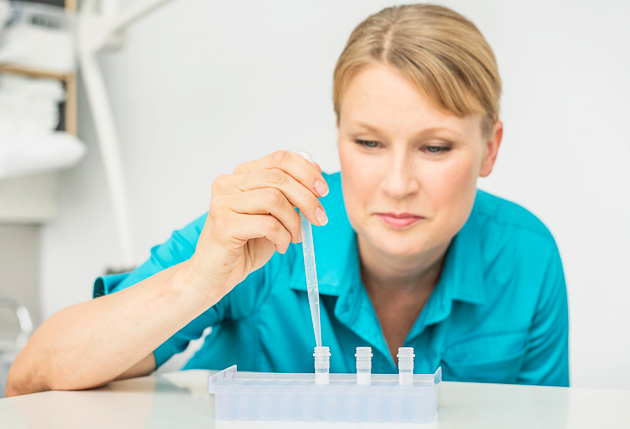Docrates uses the newest drug therapies for breast cancer
8.4.2022 Categories: Articles
Before a new drug is introduced at Docrates Cancer Center, there must be sufficient research-based medical evidence to support its effectiveness and safety. In addition, the doctor always assesses the expected benefits and possible risks of using the drug for each patient and considers the use of the drug on that basis. The drug is used in accordance with the related recommendations and precautions. Similarly, new information on the active substance is constantly being monitored. The aim is to implement the treatment while minimising risks and side effects.
Individual breast cancer treatment must always be based on careful diagnostics. In addition to imaging examinations, the use of molecular profiling, for example, is an essential part of the diagnostics of breast cancer. Molecular profiling allows treatment to be targeted at the patient group likely to benefit the most from it. The main biological factors guiding the treatment of breast cancer are the levels of estrogen and progesterone receptors (hormone receptors) and the expression of the HER2 gene. Newer ones include the PD-L1 assay and other gene assays. Docrates strives to target treatments at cancer subtypes, which has improved the treatment results in many patient groups with poorer prognoses.
New drug therapies for patients with HER2-positive breast cancer
Docrates Cancer Center’s oncology specialist Tom Wiklund says that Docrates has introduced the newest drug therapies for HER2-positive, triple-negative and hormone-sensitive breast cancer.
The new drugs, trastuzumab deruxtecan and tucatinib, are primarily intended for patients with metastatic HER2-positive breast cancer who have received at least two prior treatments for HER2-positive breast cancer. The mechanism of action of trastuzumab deruxtecan is based on the active substance being delivered with a precisely targeted antibody directly into the cancer cells in the tumor, reducing damage to healthy cells. The drug has proven to be more effective than current drugs.
Another new drug for patients with HER2-positive breast cancer is tucatinib, which blocks the activity of the HER2 protein. Because HER2 helps cancer cells to grow and divide, blocking it helps stop the growth of these cells, which results in their death and slows down the progression of the cancer. This drug is particularly suitable for patients with brain metastases.
New targeted drug for triple-negative breast cancer already in use at Docrates
The new drug for patients with locally advanced or metastatic triple-negative breast cancer is sacituzumab govitecan. It can be administered to patients who have received at least two prior systemic therapies, at least one of which has been administered for the treatment of advanced cancer.
According to oncology specialist Tom Wiklund, Docrates was the first in Finland to introduce sacituzumab govitecan in December 2021.
“It’s too early to assess personal results, but studies have found the drug to be well-tolerated and effective,” says Wiklund.
The drug consists of a molecule in which a monoclonal antibody detects a cancer cell. When it attaches to the cancer cell, the cytostatic agent attached to the antibody is released into the cancer cell and prevents the division of the cancer cells.
Promising research results on the newest drug therapies
Tom Wiklund also mentions other new drug therapy options for different types of breast cancer, such as PARP inhibitors in patients with advanced triple-negative breast cancer who are carriers of the BRCA gene mutation and therefore have a hereditary increased risk of developing breast cancer. Immunological treatments, in turn, are a new form of treatment of metastatic triple-negative breast cancer.
In early-stage breast cancer, it is possible to use immunological treatments (e.g. pembrolizumab) as preoperative neoadjuvant therapy in combination with chemotherapy. In addition, the use of PARP inhibitors as part of adjuvant therapy may be considered in breast cancer patients who are carriers of the BRCA gene mutation. PARP inhibitors (e.g. olaparib) bind to the active site of the PARP enzyme and prevent it from dissociating from the DNA, resulting in double-strand DNA breaks in dividing cells. The accumulation of this DNA damage leads to the death of these cells.
In the adjuvant therapy of patients with hormone-sensitive breast cancer, it is possible to use the new drug called abemaciclib in combination with hormonal therapy.
Wiklund says that all of these new drugs are already in use at Docrates, except for tucatinib.
“There are several randomised studies on these new drug therapies which show that these drugs are significantly more effective than previous treatments,” says Wiklund, describing with satisfaction the basis for the introduction of the new drugs.
Cancer drug development trajectory – progress is visible with a delay
“In addition to the ongoing search for new targeted drugs which can be precisely targeted at the disease of an increasing number of cancer patients, the aim is to find the patients whose disease type and state are such that they will benefit as much as possible from these drug therapies,” Wiklund says, describing the development trajectory of cancer drugs.
“New drugs are almost invariably first used in patients with metastatic cancer for which they have already received other treatment. For individual patients, new drugs can be major steps forward,” he adds.
“As research-based information and experience accumulate, drugs are usually introduced at earlier and earlier stages and finally as adjuvant therapies,” Wiklund sums up.
Wiklund sees the discovery of new individual targeted drugs bringing comforting information to all cancer patients, regardless of the type of cancer.
“Each new drug is a sign that development is taking place. The type of cancer in an individual cancer patient may also change as the disease progresses, as the biology of cancer changes over time. For this reason, it is also important to take biopsies at regular intervals as the disease progresses. Breast cancer detected as HER-positive may become triple-negative as the disease progresses,” says Wiklund.
Sources:
- https://www.ema.europa.eu/en/medicines/human/EPAR/tukysa
- https://www.mediuutiset.fi/uutiset/olaparibi-hidasti-metastaattisen-rintasyovan-etenemista/746b1bbb-cefb-334f-aee7-cf07391c704c
- https://www.ema.europa.eu/en/medicines/human/EPAR/verzenios
- https://www.dagensps.se/life-science/astra-zenecas-nya-brostcancerbehandling-kan-nu-anvandas/
- https://www.ema.europa.eu/en/medicines/human/EPAR/trodelvy











